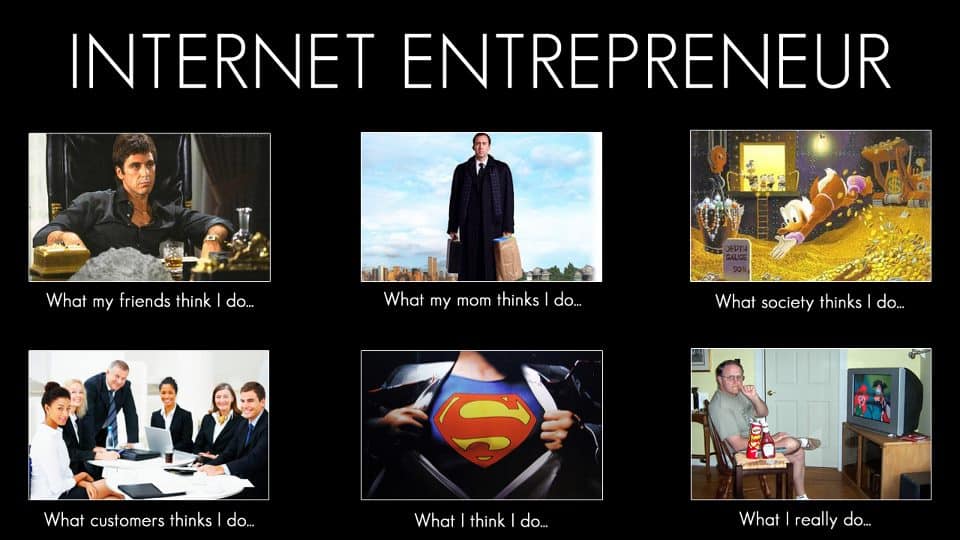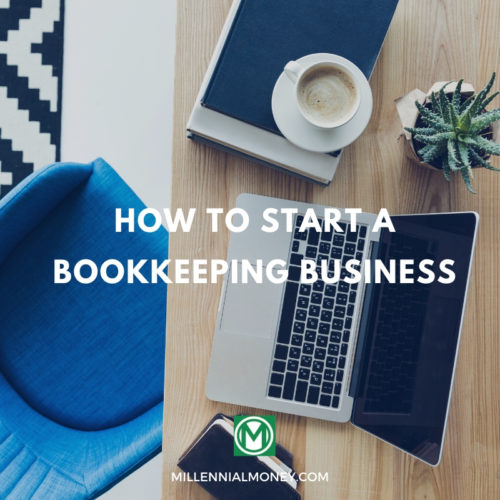A lot of entrepreneurs don’t ask the right questions before launching a company. I failed 3 times before launching my first successful company. In this post I’ll show you what I’ve learned so you don’t make the same mistakes I did.
Also, as Millennial Money has grown, I have been getting more and more emails each week from readers who want to start an online business, launch a consulting business, or start some other type of company.
I thought it would be valuable to share some of the advice I have been giving everyone who hits me up and wants to become an entrepreneur.
What I’ve learned as an Entrepreneur

Sure, it’s never been easier.
For less than $20 you can launch a blog. For $199 you can create an LLC and be off and running.
We’ve all seen Shark Tank. Everyone thinks they can launch an app, or a clothing company, or an online store or whatever. Some can. But many won’t be successful.
Being an entrepreneur is a lot harder than you think. Like a lot harder.
Like probably the hardest thing you’ve ever worked for and (then even) harder.
Even though it’s easy to launch a company, it’s hard to execute on an idea, keep up with the pace of innovation, and gain market share.
I failed 3 times before I had a successful company. And successful meaning I made enough money from the company that I could take a salary, sustain myself living off of the income, and invest for the future.
I’m not going to sugar-coat it. Most people aren’t cut out to be an entrepreneur.
Are you?
9 Steps: How to be an Entrepreneur
Here are 7 things I think that you should know if want to be or you are currently in the process of becoming an entrepreneur. Most entrepreneurs fail, but I hope these ideas give you a better shot. Here’s what I’ve learned.
1. It’s not just the idea, it’s the execution
Ideas are a dime a dozen. Good ideas are everywhere. I had the idea for Uber a full 4 years before the company launched, but why didn’t I become a billionaire? Because ideas don’t mean anything if you can’t execute on them.
Seriously, making money is all about execution. So as you brainstorm side hustle ideas while walking through this chapter, think hard about what you can execute with your skills and time.
This took me a long time to learn. I had 3 failed companies before I had 3 successful ones. Or rather I had 3 really good ideas that I tried. Why did I fail? Because I failed to execute. It was a simple as that. It’s the same reason why so many startups fail. Becoming a successful entrepreneur is all in the execution.
A lot of people have good ideas. In fact, at least 5 other people probably have your same idea right now. So when you come up with a really good idea, then come up with 10 more. Then be prepared to execute and dedicate everything you have to bring your idea to life.
Most people fail to execute.
If you want to learn more here is the best book I’ve read on executing a strategy: Your Strategy Needs a Strategy: How to Choose and Execute the Right Approach
2. Find something you really love (like really really love to do)
Most of the time being a solopreneur or entrepreneur sucks. Like it seriously sucks. It is going to take a ton of time to get your blog, product, service etc. off the ground.
You have to love it. If you don’t really love it then you won’t stick with it and you won’t invest the “above and beyond” time that it takes for most companies to reach an inflection point.
I made this mistake – the first app company that I tried to launch was in a niche (nightclub bookings) that I just didn’t care about. Sure it was a good idea, but I failed to stick with it because I didn’t like going to clubs and eventually just lost interest.
You have to really love what you do – it will show in your pitches, it will show in your product, and it will keep you burning the midnight oil when no one else cares.
3. Do you have the skills and resources to make it happen?
Before launching any business, just you need to be realistic about the amount of time you have to dedicate to it, you also need to be realistic about whether or not you currently have the skills required to make money doing it. Or if you don’t have the skills how long it will take to develop the new skills AND resources required to make it happen and how realistic it is that you will take the time to actually do it.
For example, back to the mobile app idea – everyone these days has an idea for a new mobile app, but if you don’t have any experience coding, then it’s going to take you a lot more time to get it off the ground. Sure, you can learn how to code as part of your business, but realize that it’s going to take you a lot more time to launch and a long time until you start making money.
I recommend that you pick an idea that you can execute on quickly and that requires a manageable amount of resources. You definitely don’t want to sink a bunch of money or money you can’t afford into an idea.
4. What is the market demand and competition for your idea?
Analyzing and understanding market demand is the first place you should start before launching any business – because if people don’t want what you have to sell or too many other people are selling it, then you won’t make any money.
There are essentially three ways to compete – based on price, value, or both. So you can either be cheaper than your competitor, offer more value for the same price, or be cheaper and offer more value.
The higher the market demand for your service or product, the more money you can charge and the more money you can make. Market demand is determined by supply and demand, or the number of people who want to buy something (customers) and the number of people selling it (competitors).
If you really want to make as much money as possible side hustling then you need to research the market demand for your service or product idea. While you don’t have to spend a ton of time doing market demand research, the more you know about the market the easier it will be for you to develop and sell your product or service.
Three easy ways to analyze the market demand for a service or product is to ask your potential customers what they want through in-person discussions or online surveys and analyze Google search volume data using Google Keyword Planner.
If there is no one else offering what you want to offer, then the reason is that no one is willing to buy it, or you’ve stumbled on an insanely good side hustle idea and might have an early mover advantage. No matter what your side hustle idea is, the more you know about your competitors the easier it will be for you to market and sell your own services.
5. Come up with an actual business and marketing strategy
It’s actually tough to come up with a good business and marketing strategy. Most new entrepreneurs sacrifice one for the other, but you really need both. Saying that you want to “grow revenue 20%” the first year is not a business strategy. Saying that you are going to “use social media” is not a marketing strategy. Research what goes into building both and build them.
One of the best definitions of strategy that I’ve read is: “A business strategy is a set of guiding principles that, when communicated and adopted in the organization, generates the desired pattern of decision making. A strategy is therefore about how people throughout the organization should make decisions and allocate resources in order accomplish key objectives” from Michael Watkins in this Harvard Business Review article on de-mystifying strategy.
Michael Watkins also wrote a great book on how to come up with a great business strategy in your first 90 days that I highly recommend: The First 90 Days: Proven Strategies for Getting Up to Speed Faster and Smarter, Updated and Expanded
If you really want to blow your mind, here is the best book on strategy that I have ever read and one of my all time top 5 favorite books: Blue Ocean Strategy, Expanded Edition: How to Create Uncontested Market Space and Make the Competition Irrelevant
6. Find your first customer
So now you’ve got a great business idea, how do you actually get clients? While this depends on the type of product or service you are selling, generally the easiest way is to sell into the same community (online or offline) you surveyed to analyze market demand.
If people already know you, they are much more likely to buy from you and are the best place to start.
Focus on selling your first client or first product. Don’t stress or worry about selling to a lot of people at first. While you might launch the best product or service ever and you might have more sales than you can handle, it’s more likely it will be tough to sell your first few clients or product.
This is normal and actually to your advantage since you will want to grow your side hustle at a pace you can handle. One of the worst thing for a young business is to oversell and not be able to handle demand.
While it can be tough to sell your first client or first product, if you do it correctly your first customers will be the most valuable customers you ever have. Here’s why. Selling slowly at first will help you do two essential things that can significantly increase the potential of your business having success.
First, you should always over deliver for your first clients – give them as much value as possible, go above and beyond to make them happy, even if it takes a ton of extra time because you will want/need your first client or purchasers to be your references. Having a great reference will make selling your second client or product so much easier.
7. Bootstrap as long as you can
I think most companies take on venture capital or investment way too early. Money is definitely getting tighter to raise for startups, but in some industries like edtech and fintech the investments are still massive and tons of money is available. But don’t take it too soon.
The sooner that you take money, the sooner you will have to listen to often demanding VC’s who will want to have a say in the big decisions you make. You will go from free and inspired, to being under a microscope. Here are two great articles from Techcrunch worth reading if you are interested in getting investors for your company: Venture Capital is a Hell of a Drug and The Pitfalls of Venture Funding.
There are so many free and cheap resources available to new entrepreneurs, as well incubators, and collaborative workspaces where you can learn from other entrepreneurs. I don’t recommend taking on any investments before you really have something you need money for and scale is not always a good reason. Bigger is not always better. A lot of companies fail because they try to get too big too fast.
Try to be as lean as possible. An incredible book on this topic, as well as getting to market quickly, and worth reading, if you have any interest at all in being an entrepreneur, is: The Lean Startup: How Today’s Entrepreneurs Use Continuous Innovation to Create Radically Successful Businesses

8. Don’t invest ALL of your money into your start-up
A lot of founders make this mistake and I did too when I launched my first company. I took all of my money ($10,400) and put it into an app idea (this was in the beginning of the app economy and I knew apps were going to be huge). It was all of my money and I lost it pretty quickly. Then I had to move back home with my parents and start from scratch.
You should always have some money saved up before going out on your own. I typically recommend that any entrepreneur should have at least 6 months of expenses saved since it takes a lot of companies at least 6 months to start making money. Maybe you have been investing your emergency fund and can use some of the growth, but I strongly recommend against cashing out your 401k.
Keep as much money saved as you can, especially in your retirement accounts. It always makes me sad when I hear about entrepreneurs who risked (and lost) their retirement savings. You can still be an entrepreneur and keep your 401k account. It’s often not worth the risk.
9. You will burnout, but here’s how to avoid it
I learned this the hard way. I burned out a few times really really hard. You can’t work consistently for 80+ hours a week. Or at least you can’t do it as easily after you turn 25. When I was in my mid-20’s on my way to becoming a millennial millionaire I was absolutely crazy. I worked 16-18 hours a day non-stop for years. 7 days a week.
It was all work all the time. I would fall asleep on my laptop and wake up with my laptop. It was unhealthy. It actually hurt my performance. And looking back it’s easy for me to see in hindsight that I was super inefficient and wasted a ton of time.
Sleep more. Work out. Do Yoga. Just do it. Build better habits. Sleep is more valuable than anything else. You will think better when you sleep. It took me a long time to learn this. Working out is just good for you. And Yoga keeps you chill especially if you are working long hours. Just those 3 things will give you an advantage – seriously.
Find your most efficient work time and only work during that time. This is different for everyone. I work best between 1 pm – 1 am (I always have). I am writing this post now at 11 pm. I can crank out a 2,000-word post at 11 pm, but can’t write a single word at 9 am. My mother is the same way. Sleep patterns are genetic. I am not a morning person. I don’t really start working before 11 am every day unless I really have to, but it’s not my best self.
If you want to learn how to be more efficient I strongly recommend learning about the 80/20 principle. It changed my life. I started spending my time on the tasks that actually moved the needle and wasting less time. Read the original book about it (before Tim Ferris popularized the idea): The 80/20 Principle: The Secret to Achieving More with Less
10. Figure out when it’s time to scale
If you want to make millions of dollars from an idea that started as a business ideas, then you should scale it by hiring other people to do some (if not most) of the work. The more you can distribute the work, the less you can work, and the faster you can grow your business.
You should consider scaling your business if you have been able to consistently sell your service or product and have been making a profit for the past 6 months, or if the demand for your services or products have exploded quickly.
If the demand for your services or product is higher than you can meet on your own, or if the demand is consistent and you don’t want to do the work, then you should consider hiring other people to do the work.
By hiring employees, you can focus on selling (connecting your supply with the demand) and running the business. And when I mean employees here it doesn’t mean you have to hire full-time employees, they could be part-time or contract employees.
It’s better to start small, since the last thing you want is to hire too many people and not be able to make enough money to pay them. Once again this is why it’s so important for the demand for your business to be consistent.
The better your team is at doing the work the more efficient they get, so you eventually charge your clients or customers more money, but your team is more efficient, so the time it takes to do the work goes down, resulting in an increased profit margin for you – which means more money. Over time if you manage the business well, you can make an absolutely insane amount of money.
11. Always be monitoring, testing, and adapting
The world moves really fast, and markets and opportunities change quickly. If you are an entrepreneur just starting out, you need to move as fast as you can. You also need to adapt and be responsive to market changes. Technology has rapidly increased the rate of innovation and change. For many small companies, it’s really hard to keep up.
Most companies that fail just didn’t adapt quickly enough. The only way to do this is to live very close to the market that you serve and understand how you really compete. I have seen many online businesses fail because of a simple Google algorithm update that wiped out their organic traffic, or others that failed when a bigger player just simply took their idea, copied them, and took it to the masses.
Any great idea will get copied quickly by other companies monitoring the market. So you need to make sure you iterate, evolve, and try to capture market share as quickly as you can.
A great book to read on the topic is: The End of Competitive Advantage: How to Keep Your Strategy Moving as Fast as Your Business
There are no excuses – as an entrepreneur you control your destiny
Becoming an entrepreneur has changed my life. It’s taught me more about the world and more about myself. I am forever grateful for my own mentors and the opportunity to learn from their mistakes. I hope you’ve learned something from mine.
If you’re not an entrepreneur don’t worry that doesn’t mean you can’t still maximize your value! We aren’t all driven to create. Sometimes it’s just not worth the risk – it’s up to you to decide.
But if you are an entrepreneur, then I wish you the best of luck in launching or growing your company. It’s worth it.






Read 17 comments or add your own
Read Comments